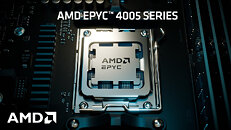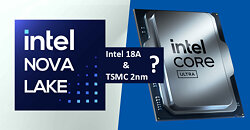
Potential Next-gen AMD EPYC "Venice" CPU Identifier Turns Up in Linux Kernel Update
InstLatX64 has spent a significant chunk of time investigating AMD web presences; last month they unearthed various upcoming "Zen 5" processor families. This morning, a couple of mysterious CPU identifiers—"B50F00, B90F00, BA0F00, and BC0F00"—were highlighted in a social media post. According to screen-captured information, Team Red's Linux team seems to be patching in support for "Zen 6" technologies—InstLatX64 believes that the "B50F00" ID and internal "Weisshorn" codename indicate a successor to AMD's current-gen EPYC "Turin" server-grade processor series (known internally as "Breithorn"). Earlier in the month, a set of AIDA64 Beta update release notes mentioned preliminary support for "next-gen AMD desktop, server and mobile processors."
In a mid-April (2025) announcement, Dr. Lisa Su and colleagues revealed that their: "next-generation AMD EPYC processor, codenamed 'Venice,' is the first HPC product in the industry to be taped out and brought up on the TSMC advanced 2 nm (N2) process technology." According to an official "data center CPU" roadmap, "Venice" is on track to launch in 2026. Last month, details of "Venice's" supposed mixed configuration of "Zen 6" and "Zen 6C" cores—plus other technical tidbits—were disclosed via a leak. InstLatX64 and other watchdogs reckon that some of the latest identifiers refer to forthcoming "Venice-Dense" designs and unannounced Instinct accelerators.
In a mid-April (2025) announcement, Dr. Lisa Su and colleagues revealed that their: "next-generation AMD EPYC processor, codenamed 'Venice,' is the first HPC product in the industry to be taped out and brought up on the TSMC advanced 2 nm (N2) process technology." According to an official "data center CPU" roadmap, "Venice" is on track to launch in 2026. Last month, details of "Venice's" supposed mixed configuration of "Zen 6" and "Zen 6C" cores—plus other technical tidbits—were disclosed via a leak. InstLatX64 and other watchdogs reckon that some of the latest identifiers refer to forthcoming "Venice-Dense" designs and unannounced Instinct accelerators.









































































